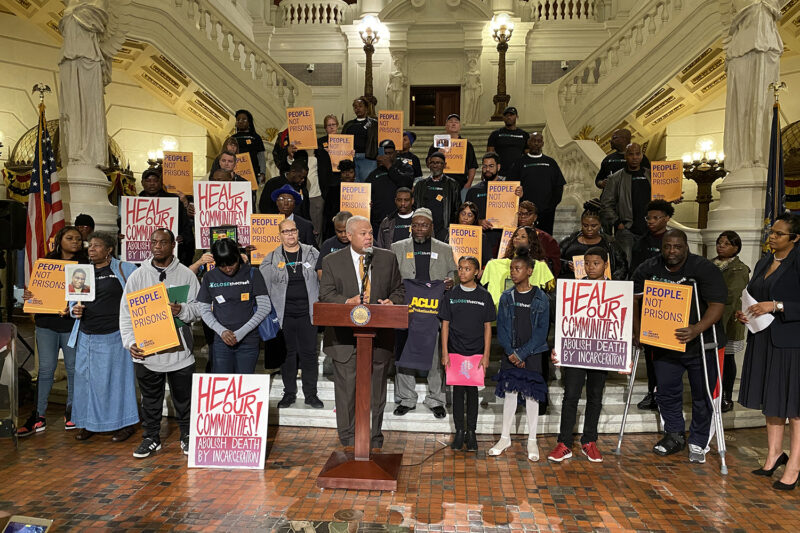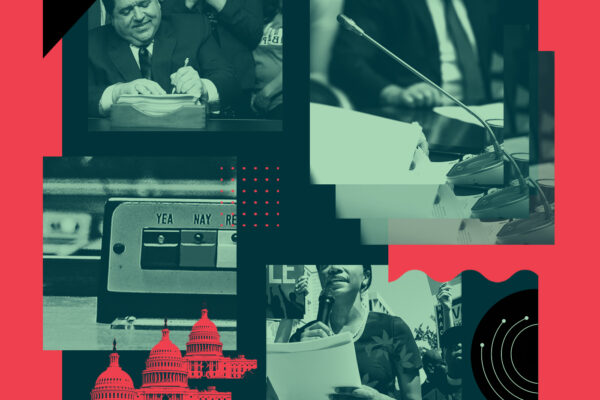This year, despite deep political divisions, one area of growing consensus from stakeholders on both sides of the aisle was the need to reform our country’s criminal legal system.
Implementation of the First Step Act coincided with Democratic presidential candidates making criminal legal reform a cornerstone of their policy platforms — so much so that 14 of the original field of candidates supported a 50 percent decarceration goal. Here at the ACLU, we continued to deepen our commitment to challenging racism in the criminal legal system and getting people out of prison and jail.
The Problem
The numbers are astonishing. Since 1970, our incarcerated population has increased by 700 percent — more than 2.1 million people are in jail and prison today. Extreme sentences keep more people in jail for longer periods of time, prosecutors have almost unlimited power, and nearly 700,000 people are in jail daily.
In 2019, our Campaign for Smart Justice alone engaged with almost 6,000 volunteers across the country and met directly with more than 2,000 state legislators on legislation aimed at challenging injustice in the criminal legal system. These efforts ultimately helped pass 75 bills in statehouses across the country, translating into thousands fewer people incarcerated.
Here are some highlights from the fight this year:
Sentencing Reform
Mandatory minimum sentences, “three strikes” enhancements, and restrictions on release are a piece of the twisted equation that holds millions of people in jail and prisons far longer than they should be. Scrapping these tough-on-crime laws is key to dismantling the architecture of mass incarceration.
In Delaware, we played a leading role in an incredibly productive legislative session that saw 11 reform bills passed, including H.B. 5, which restored judges’ power to impose concurrent sentences and eliminated requirements that sentences run consecutively for most crimes. Lawmakers also passed S.B. 47, which eliminated racially discriminatory sentence enhancements for drug possession within 300 feet of schools and parks, and revised drug weight classifications to reflect usage patterns accurately.
In Missouri, together with the Missouri Sentencing Coalition, we helped pass H.B. 192, which requires the parole board to evaluate those currently serving mandatory minimum sentences and decide if they should be released. After four years, this reform is projected to decrease the state’s prison population by 925 people.
In Oklahoma, alongside Oklahomans for Criminal Justice Reform, we succeeded in passing HB1269, a compromise measure aimed at making our 2016 drug and property reclassification ballot initiative retroactive. This law ultimately led to Governor Stitt approving the release of 527 people through commutation, the largest single-day commutation in U.S. history.

Prosecutorial Reform
Voters are increasingly recognizing the power that prosecutors hold as gatekeepers of mass incarceration. To address the disproportionate power that prosecutors wield, this year in Connecticut, we led the effort to pass S.B. 880, a first-of-its-kind law that would create the most comprehensive transparency requirements for prosecutors anywhere in the country. Our campaign was led by formerly incarcerated people and focused on centering directly impacted populations.
S.B. 880 requires prosecutors’ offices to collect and share data on charges, diversionary programs, bail requests, plea deals, contact with victims, sentencing recommendations, demographic information, and more.
In Louisiana, our work this session included passage of S.B. 146, a landmark bill to limit prosecutors’ practice of unjustly jailing sexual assault and domestic violence victims using material witness warrants. This victory built off of our lawsuit in 2017 challenging Orleans Parish District Attorney Leon Cannizzaro’s use of fraudulent subpoenas to jail witnesses of crimes.
This progress continued with passage of Oregon’s H.B. 3224, which requires every district attorney to create policies for the core functions of their office and make them available to the public.
Bail Reform
In 2019, we fought to end wealth-based incarceration and pass bail reform in more than 30 states. One highlight took place in Colorado, where together with partners we successfully advocated for H.B. 1225, which eliminates cash bail for petty and low-level offenses, and S.B. 91, which mandates quick release once bond is posted and eliminates fees assessed against the bond amount.
Re-Entry
Incarceration often prevents people from accessing jobs, housing, and educational opportunities long after serving time in prison or jail.
In August of this year, the ACLU of Kentucky and its partners in the Smart on Crime coalition celebrated the passage of S.B. 57, a bill that expanded expungement opportunities for an important category of felony offenses.
The ACLU of New Mexico’s Smart Justice Campaign led the advocacy campaign with its partners in the New Mexico SAFE coalition for passage of a package of criminal legal reform bills, including legislation to “Ban the Box” and expand expungement opportunities for an array of offenses.
The deeply entrenched systems that we confronted this year not only destroy lives; they ultimately do not make communities safer and increase the likelihood that people return to prison.
Dismantling the labyrinth of racist policies that make up the criminal legal system is no easy task, and much work remains to be done in 2020 and beyond. But the ACLU’s work to advance justice, expand freedom, and fight racism continues to grow, deepen, and win significant legislative victories throughout the country.
Part of an end of year wrap-up series. Read more:
Under Attack by Trump, Immigrant Justice is Advancing in the States
Ari Rosmarin, Deputy Director, ACLU Campaign for Smart Justice

